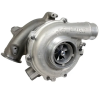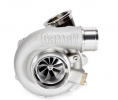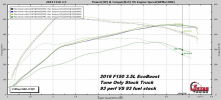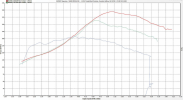Obviously? Which one of these is a diesel turbo, and which one is a gas turbo?
View attachment 74252View attachment 74253
I've raced turbo cars on race tracks, tuned them on dynos, and worked with ECUs that manage them. Diesels have a different EGT range, benefit from turbocharging differently, and they'll run waaay different A/R ratios because the volumes are way different... but the turbo itself doesn't change much.
You seem to assume a turbo has to "stop spooling" after some random amount of time - this is not the case. The turbo is *always* spinning because it's always attached to the manifold. Where they make torque varies depending on the turbo's efficiency map and the engine's own VE. Ecoboost engines make torque down low, absolutely, but that has nothing to do with the turbo somehow not spooling at RPM. At 5500 RPM, they're still making enough power to match your Hemi - with a tune they're cranking out almost 100HP more (stock Hemis do ~350 wheel)
View attachment 74254
I wasn't kidding when I said that the turbos aren't limited any more than your exhaust valves. Because modern turbos are constantly lubricated and cooled, the EGT levels that are dangerous to the turbo are equally dangerous to your exhaust valves. Modern ECU's are constantly monitoring models for inlet temp, EGT, charge temp, exhaust flange temperature, you name it. If you're pulling hard up a grade for a *long* time, they might add fuel, pull timing, and do all sorts of stuff... but they don't just stop spooling. An ecoboost with a *big* turbo kit will behave the exact opposite of stock. The bigger a turbo you put on, the more your torque curve looks like this
View attachment 74266
Again... do some searches before you just type stuff.
I love my hemi - especially in terms of constantly improved reliability - but beating a 2.7 in a drag race doesn't mean squat. A 3.5 with a tune, bolted to a *much* lighter truck will spank your hemi any day of the week.. sorry.















